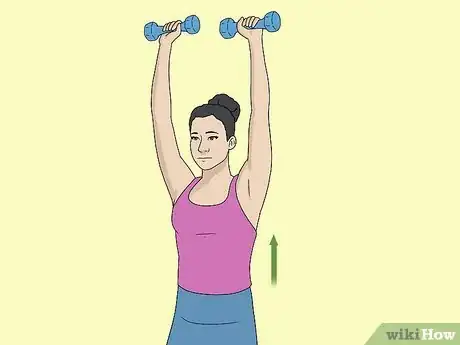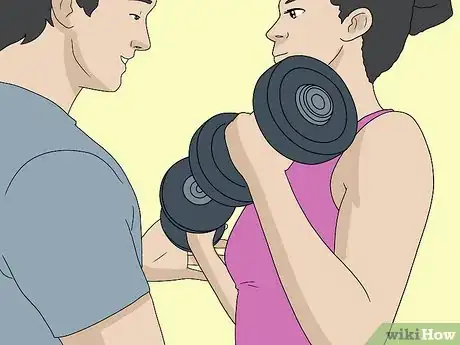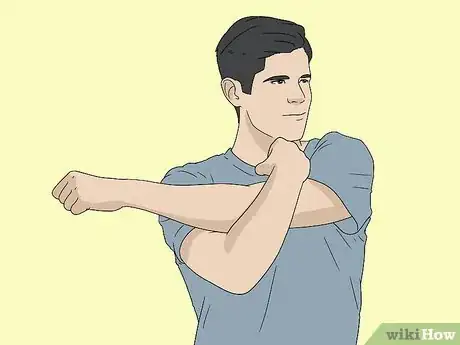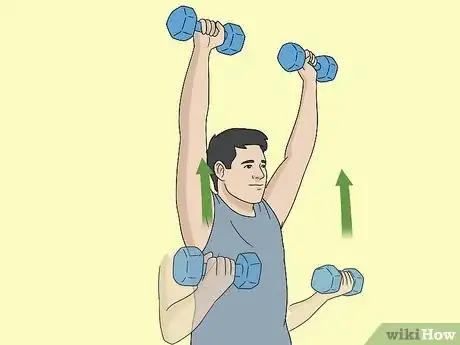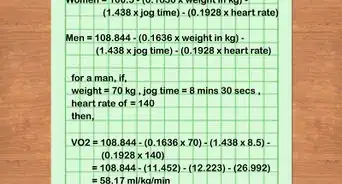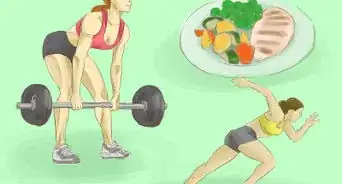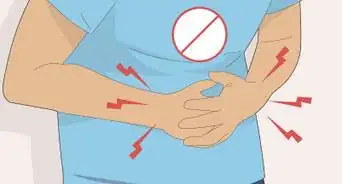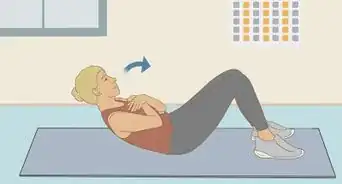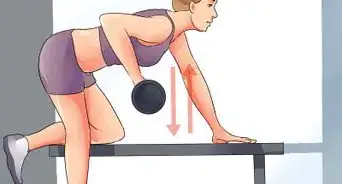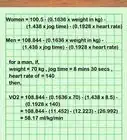This article was co-authored by Adam Shuty and by wikiHow staff writer, Hannah Madden. Adam Shuty is a Certified Strength and Conditioning Specialist and owner of ATOMIC Total Fitness, a fitness training studio in New York, New York. With over 15 years of experience, Adam specializes in weightlifting, strength and conditioning, and martial arts. Adam holds a BS in Industrial Engineering from Virginia Polytechnic Institute and State University. In 2014, Adam appeared on the Live With Kelly and Michael Show as one of the top five fitness instructors in the country.
There are 10 references cited in this article, which can be found at the bottom of the page.
This article has been viewed 21,896 times.
Working out your arms is an important part of any exercise routine. However, if you’ve noticed an uneven muscle tone or a difference in the strength of your arms, you may need to make a few changes to your routine. Fortunately, evening out your arms is as simple as correcting your form and doing extra strength training to build up your muscle tone and balance out your arm strength.
Steps
Exercising with the Proper Form
-
1Watch your form in the mirror as you exercise. Sometimes, a muscle imbalance can be caused by exercising improperly. When you workout, try to do it in front of a mirror so you can see your arms, and check to see if you are working both in the same way.[1]
- For example, when you do dumbbell curls, you could be leaning over too much on one side. This can create an imbalance in your muscle tone.
- When you lift barbells, you could be lifting one side higher than the other. This could make one arm stronger.
- If you are feeling pain or discomfort as you work out, it could be a sign that your form is off.
-
2Focus on your weaker side when you are doing bilateral movements. When you use barbells or other equipment that works both of your arms at the same time, make sure you engage your weaker arm as much as you are engaging your stronger one. Really think about how your muscles feel and if you are spreading out the weight over both your arms.[2]
- Being mindful while you exercise can also help you avoid potential injuries.
Advertisement -
3Avoid twisting or rotating your body as you work out. When one arm is weaker than the other, your body could be compensating by twisting your core or shoulder when you do your reps. Focus on holding your body straight and not letting your torso twist or bend as you workout.[3]
- For example, when you do shoulder presses with a dumbbell, make sure your posture remains upright.
Tip: Having a friend or trainer watch you while you work out can help you spot movements like this.
-
4Work with a personal trainer to make sure your form is correct. Talk to a professional about your uneven muscle tone and work with them to create an exercise program that’s right for you. You can usually find personal trainers at your local gym or fitness center.[4]
- Personal trainers are certified in physical training and exercise, so they know how to create safe, healthy workout plans that are right for you.
Creating a Balanced Workout Routine
-
1Stretch your arms after you work out. Sometimes, uneven muscle tone can be caused by flexibility issues. After you work out, do some basic arm stretches to cool down your muscles and improve your mobility.[5]
- Pull one arm across your chest and hold it for about 30 seconds, then repeat that on the other side.
- Try pushing your arm behind your head and holding it for 30 seconds, then repeat that on the other side.
-
2Work out each arm muscle equally. Instead of focusing on just your biceps, be sure to include your triceps and your shoulders as well. You can do tricep pushups, tricep dips, and shoulder presses to include these muscles in your workout.[6]
- To do tricep pushups, get into a normal push up position but keep your arms close to your shoulders. Lower your body down while keeping your arms parallel to your torso.
- To do tricep dips, get into a crab walk position with your hands behind you facing towards you and your torso facing upwards. Lift your rear off the ground and then bend your arms to do a reverse pushup motion.
- To do a shoulder press, grab a barbell or 2 dumbbells. Stand with your legs shoulder-width apart and your back straight, and raise your weights directly above your head. Then, lower them down so the weights are next to your head.
-
3Vary your workout routine to strengthen different muscles. If you’ve found a workout routine that you love, it can be hard to switch it up. Try to incorporate different exercises into your routine so you can vary which muscles you are working out.[7]
Tip: You can also try using different equipment, like a resistance band instead of barbells.
Strengthening Your Weaker Arm
-
1Use your weaker arm to do daily activities. Often, your non-dominant arm is the one that’s weaker since you use it less. Try using your weaker arm to brush your teeth, eat food, make coffee, and do your daily activities to strengthen it incrementally.[10]
- Perform the same exercise with both arms to see how much stronger your non-dominant arm is. For instance, if you can do 10 reps of an exercise with your dominant arm and only 6 reps with your other arm, your strength gap would be about 4 reps.[11]
Variation: If you are ambidextrous, meaning you don’t have a dominant hand, try using both of your hands evenly to do your daily tasks.
-
2Workout with dumbbells more often than barbells. Dumbbells help to focus the weight on one arm instead of spreading it out over both of your arms. Try using dumbbells as much as you can so you can really focus on strengthening your weaker side.[12]
- You don’t have to give up barbells completely, but it is much easier to focus on one arm when that’s the only one you are working out.
- For example, instead of doing bicep curls with a barbell, try doing them with a dumbbell instead.
-
3Start with your weaker side when using dumbbells. This will help you work out your weaker arm before you get tired. Try doing every exercise on your weaker arm first to really focus on building those muscles up.[13]
-
4Add a few more reps of every exercise to your weaker side. To really bulk up your muscles, you can work out your weaker arm more than your stronger one. Try adding 4 to 5 more reps of each exercise to your weaker arm after you’re done.[14]
- For example, if you did 10 bicep curls on each arm, do 5 extra on your weaker arm.
- Use caution when you work out your weaker arm more, as you could actually make your weaker arm stronger than your other arm.
- Try taking at least 6 weeks off your usual workout routine to correct your muscle imbalance. You'll need at least 6 weeks to see strength gains and muscle growth in your weaker arm.[15]
-
5Take pictures of your arms once a week to track your progress. If you’ve noticed your muscles look bigger in one arm, take a photo with a date and time stamp. Keep taking photos of your arms once a week to see how your muscles in the weaker side are developing.
- It can be hard to track changes in yourself since you look at yourself every day. Taking pictures can help with that.
Expert Q&A
-
QuestionCan I fix uneven arms if one of my arms feels kind of tight?
 Adam ShutyAdam Shuty is a Certified Strength and Conditioning Specialist and owner of ATOMIC Total Fitness, a fitness training studio in New York, New York. With over 15 years of experience, Adam specializes in weightlifting, strength and conditioning, and martial arts. Adam holds a BS in Industrial Engineering from Virginia Polytechnic Institute and State University. In 2014, Adam appeared on the Live With Kelly and Michael Show as one of the top five fitness instructors in the country.
Adam ShutyAdam Shuty is a Certified Strength and Conditioning Specialist and owner of ATOMIC Total Fitness, a fitness training studio in New York, New York. With over 15 years of experience, Adam specializes in weightlifting, strength and conditioning, and martial arts. Adam holds a BS in Industrial Engineering from Virginia Polytechnic Institute and State University. In 2014, Adam appeared on the Live With Kelly and Michael Show as one of the top five fitness instructors in the country.
Certified Strength & Conditioning Specialist If your arms are feeling a little uneven and you're experiencing any kind of uneven soreness or pain, you may actually have an injury. It's best to get a quick checkup from a medical professional before taking steps to resolve this.
If your arms are feeling a little uneven and you're experiencing any kind of uneven soreness or pain, you may actually have an injury. It's best to get a quick checkup from a medical professional before taking steps to resolve this. -
QuestionHow do you fix a bicep imbalance?
 Adam ShutyAdam Shuty is a Certified Strength and Conditioning Specialist and owner of ATOMIC Total Fitness, a fitness training studio in New York, New York. With over 15 years of experience, Adam specializes in weightlifting, strength and conditioning, and martial arts. Adam holds a BS in Industrial Engineering from Virginia Polytechnic Institute and State University. In 2014, Adam appeared on the Live With Kelly and Michael Show as one of the top five fitness instructors in the country.
Adam ShutyAdam Shuty is a Certified Strength and Conditioning Specialist and owner of ATOMIC Total Fitness, a fitness training studio in New York, New York. With over 15 years of experience, Adam specializes in weightlifting, strength and conditioning, and martial arts. Adam holds a BS in Industrial Engineering from Virginia Polytechnic Institute and State University. In 2014, Adam appeared on the Live With Kelly and Michael Show as one of the top five fitness instructors in the country.
Certified Strength & Conditioning Specialist I'd start with single arm exercises. Bicep curls are a great way to even out unbalanced bicep muscles. So, what I would do is alternate your reps. Don't use barbells; keep a separate dumbbell in each hand and use the same weight for both. Over time, the bicep muscles should balance out.
I'd start with single arm exercises. Bicep curls are a great way to even out unbalanced bicep muscles. So, what I would do is alternate your reps. Don't use barbells; keep a separate dumbbell in each hand and use the same weight for both. Over time, the bicep muscles should balance out. -
QuestionHow do you fix uneven chest muscles?
 Adam ShutyAdam Shuty is a Certified Strength and Conditioning Specialist and owner of ATOMIC Total Fitness, a fitness training studio in New York, New York. With over 15 years of experience, Adam specializes in weightlifting, strength and conditioning, and martial arts. Adam holds a BS in Industrial Engineering from Virginia Polytechnic Institute and State University. In 2014, Adam appeared on the Live With Kelly and Michael Show as one of the top five fitness instructors in the country.
Adam ShutyAdam Shuty is a Certified Strength and Conditioning Specialist and owner of ATOMIC Total Fitness, a fitness training studio in New York, New York. With over 15 years of experience, Adam specializes in weightlifting, strength and conditioning, and martial arts. Adam holds a BS in Industrial Engineering from Virginia Polytechnic Institute and State University. In 2014, Adam appeared on the Live With Kelly and Michael Show as one of the top five fitness instructors in the country.
Certified Strength & Conditioning Specialist Try dumbbell chest press. You can raise each dumbbell at the same time and keep them level with one another. When you do a barbell chest press, you may tilt your back or push with one arm more than the other, which can lead to muscle imbalances. Dumbbells are a lot more dynamic and offer a better range of motion.
Try dumbbell chest press. You can raise each dumbbell at the same time and keep them level with one another. When you do a barbell chest press, you may tilt your back or push with one arm more than the other, which can lead to muscle imbalances. Dumbbells are a lot more dynamic and offer a better range of motion.
References
- ↑ https://www.military.com/military-fitness/general-fitness/workout-injuries/5-ways-prevent-workout-injuries
- ↑ https://www.youtube.com/watch?v=QO6WLGB4RBU&feature=youtu.be&t=74
- ↑ https://www.military.com/military-fitness/general-fitness/workout-injuries/5-ways-prevent-workout-injuries
- ↑ https://goaskalice.columbia.edu/answered-questions/how-can-i-develop-muscle-symmetry/
- ↑ https://journals.lww.com/acsm-healthfitness/fulltext/2016/09000/flexibility_exercises_and_performance.4.aspx
- ↑ https://www.chp.gov.hk/archive/epp/files/DoctorsHanbook_ch4.pdf
- ↑ https://www.chp.gov.hk/archive/epp/files/DoctorsHanbook_ch4.pdf
- ↑ Adam Shuty. Certified Strength & Conditioning Specialist. Expert Interview. 25 June 2021.
- ↑ Adam Shuty. Certified Strength & Conditioning Specialist. Expert Interview. 25 June 2021.
- ↑ https://www.youtube.com/watch?v=XzcQg9k_wys&feature=youtu.be&t=58
- ↑ Adam Shuty. Certified Strength & Conditioning Specialist. Expert Interview. 25 June 2021.
- ↑ https://www.youtube.com/watch?v=XzcQg9k_wys&feature=youtu.be&t=23
- ↑ https://www.youtube.com/watch?v=QO6WLGB4RBU&feature=youtu.be&t=152
- ↑ https://www.youtube.com/watch?v=QO6WLGB4RBU&feature=youtu.be&t=175
- ↑ Adam Shuty. Certified Strength & Conditioning Specialist. Expert Interview. 25 June 2021.


